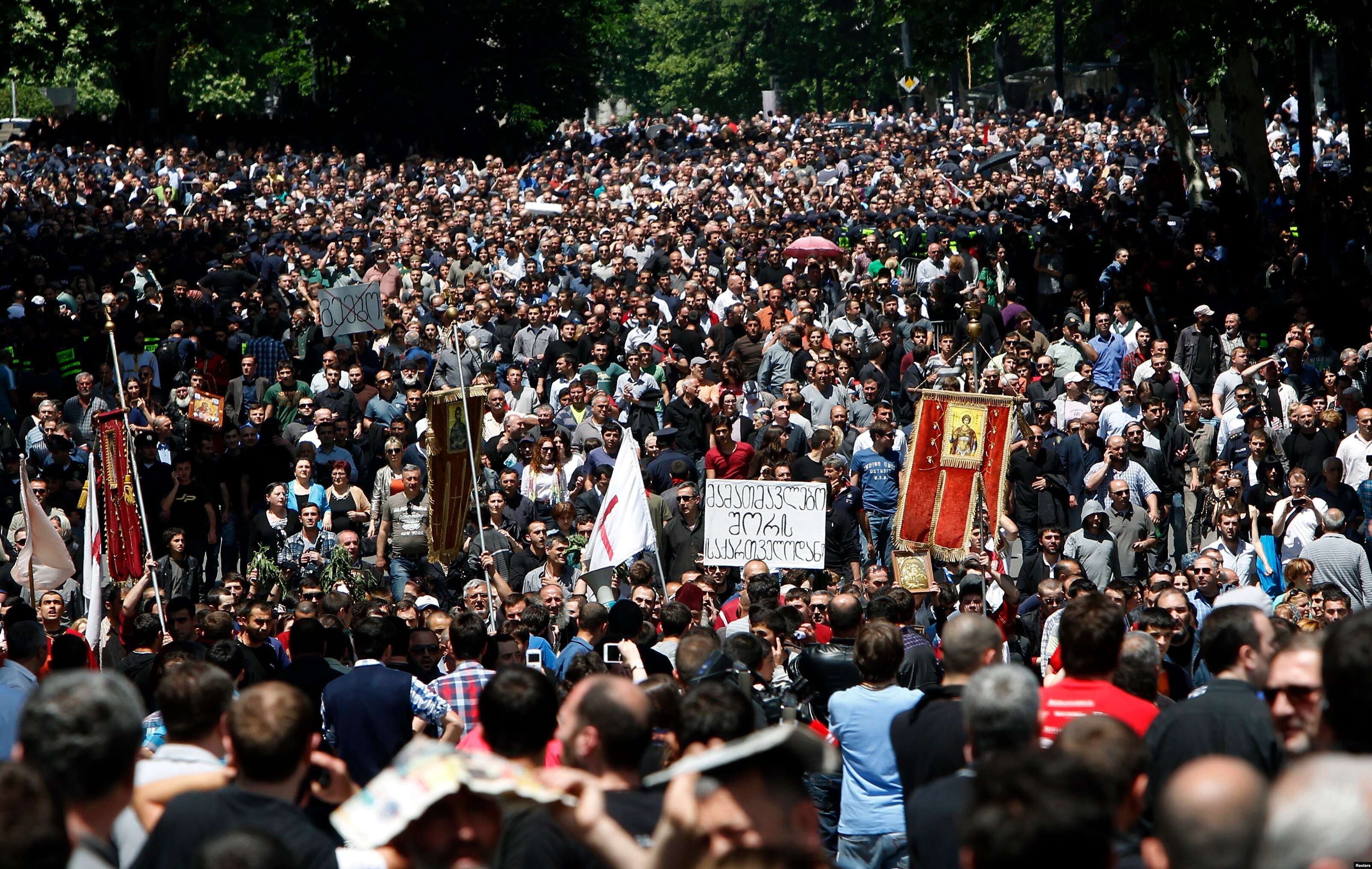Former USSR Georgia is Having The Birth Pains of The LGTB Movement

As we know from our own experience in this country the start of any civil rights movement in which
the status quo is pushed for change is painful for everyone involved. The Orthodox church in Georgia after the collapsed of the Soviet Union have become an assimilation of the Roman Catholic church 70 years ago. No one could question it and what ever the pope said it was not for discussion. That’s how it was in Georgia. They warned the gay community not to hold any pride march, no public anything. They had to stay hidden or there was going to be violence.
Imagine not telling you are going to burn in hell but that they going to stone you to death. The love of god was certainly very fluid with them. The gay community said fuck you guys we are marching. They came out and were stop by the police because of the violence, but a few days latter they did the march and this time they completed it. The church was not all that powerful, the gays were not going to be stop because it was their life’s they were fighting for and they have had enough.
They also see places like NY, California and many other states here in the Us and other nations in which gays have not retreated an inch. They see that and they learn to get results as well. They were supported by local Georgians for justice in which they could see that was being done to the gays was not Christian and more important it was civil. Breaking all the laws of the land by having the priests coming out to beat up people. Only two got arrested but that was enough because they thought they had carte blanche.
~~~~~~~~~~~~~~~~~~~~~Adam Gonzalez~~~~~~~~~~~~~~~~~~~*

Gay rights have spread in the West, but a backlash is taking hold in the former Soviet Union.
Russia’s new ban on gay propaganda is sparking Western calls for boycotts of Russian products and events. In Georgia, the Georgian Orthodox Church led thousands of the faithful to block a gay rights rally last May here in Tbilisi, the nation’s capital.
They carried signs, they sang hymns and they carried stinging nettles to thrash gay people. Then they broke through police lines.
Chanting "Kill them, kill them," protesters mobbed a minibus in which gay activists took refuge.
No one was killed that day, and injuries were fairly light. Now, Georgia is taking stock.
Shalva Kekelia was one of 200 Orthodox priests there. He said most priests tried to prevent violence.
"We told the gay people that they should go, because we couldn’t keep the crowds from attacking them," he said, referring to warnings prior to the May 17 march. "But they refused and were really aggressive. So we couldn’t do anything to stop it."
Homosexuality as sin
Father Shalva said homosexuality is a sin that must be kept out of sight in Georgia.
For us it’s absolutely unbelievable, said the priest, the father of three children. "We understand that there is a freedom for everyone to do what they want, but we don’t want them to preach homosexuality, because it’s a sin."
Like many Georgians, Shalva sees tolerance for homosexuality as a foreign import. "In Europe they always try to teach us what to do," he said in the quiet of his 100-year-old church off Tbilisi's busy Rustaveli Avenue. "Why do they think that we are that stupid, that we don’t know what we have to do?"
But, only a few blocks away, David Shubladze, a founder of LGBT Georgia, sits at a garden café. He said Georgia has its own, homegrown tolerance.
"There were manifestations to support us that were organized, not by LGBT people, but by normal Georgian citizens," he said, referring to a petition drive. "They gathered 15,000 signatures, and gave it to parliament so that they would investigate the May 17 violence."
Citizen support for LGBT
When a ruling party congressman questioned the signatures, people posted their photos on a Facebook page, some with notes saying: "I signed and I am real."
Due to public pressure, a taboo was broken: Two priests went on trial, charged with using violence and threats to interfere with a demonstration. One was acquitted. The other is to go on trial this week.
Alexander Rondeli, a Tbilisi think tank director, said the aftermath of the anti-gay violence is positive.
"What happened is not bad because after that the taboo about impunity of criticism of the Church was lifted," said Rondeli, president of the Georgian Foundation for Strategic and International Studies. "And now many people criticize that. Before the Church was taboo. We could not discuss what church was doing."
Georgian Prime Minister Bizdina Ivanishvili said that his government protects minorities.
Three days later the same group was able to have a peaceful rally," he told VOA in an interview at his Estate in Ureki. "The police acted in a very sharp and distinct way, and those who were agitating crowds and forcing them against minorities were punished. It was a very clear-cut example of how government acted in defense of those minorities."
As this traditional society moves into the 21st century, Georgia’s new generation can be expected to grapple with more and more societal change.
Comments